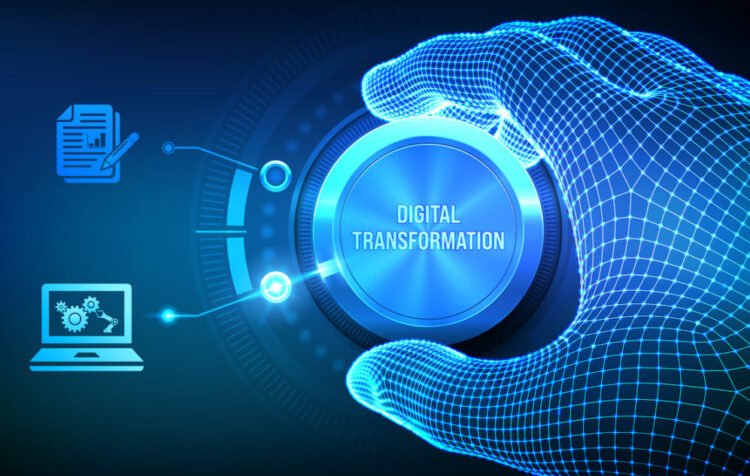Business performance improvement is a core goal of organizations. They develop core capabilities that drive a sustained transformation to achieve the set strategic objectives. Further, high-performance firms adopt policies for change management and adaptation to remain competitive in an unpredictable business environment. One capability that impact organizational performance is information technology (IT). Significant competitive gains are linked to superior IT resources that support digital business. Strategic integration of IT into organizational processes is seen as a way to promote greater digitization and transform a firm. IT-driven transformation encompasses the competitive capabilities drawn from information technology. The transformational potential of IT is seen in business processes, relations, consumer experience, clients, and disruption. Thus, a fundamental characteristic of digital transformation is the ability to change traditional models or confer new capabilities. The technologies should alter firm operations, support expansion to different markets or customers, and yield competitive gains. Conceptually, digital transformation encompasses Continue reading
Modern Information Systems
Role of Information Technology in Turbulent Business Environments
A modern organization responds to continuous changes in the external environment, transforming its behavior, operational practices, and business processes. Business transformations cause changes in information systems (IS) supporting business processes, and changes in the corresponding IT infrastructure. In some cases, these changes may affect the corporate IS as a whole. The main feature of changes in a turbulent external environment, and, consequently, in corporate IS is their unpredictability. Thus, on the one hand, the corporate information system must ensure the effectiveness of the current business model, and on the other, possess the necessary level of flexibility to implement unpredictable changes in requirements. A modern organization operates in a highly turbulent external environment, so it must have a high level of adaptability or agility. In such environment, the conceptual model of a flexible corporate IS is defined as a working system that must compensate for the largest number of gaps caused Continue reading
The Benefits and Challenges of Enterprise Resource Planning (ERP)
Information management systems play a crucial role in ensuring that the organisation becomes efficient and effective, but companies need enterprise planning to centralize data collection, storage and data processing. Enterprise resource planning is a technology that deploys computer technology to integrate various organisational resources—such as human resources, assets, information resources –across the organisation. The intention of ERP systems is to streamline an organisation’s data access, information sharing, business continuity, and revamping the decision-making processes. When ERP systems were invented in the mid-1990s, organisations shifted their attention to embrace the capabilities of ERP components; and a decade later this technology still moves on strong. However, during their early days, ERP systems enjoyed acceptance from large manufacturers, a trend that has since shifted dramatically. ERP systems have grown from mainframe computers to more flexible, robust, and seamless applications. Today, small businesses are able to deploy robust ERP systems in virtually every operational Continue reading
Benefits of Blockchain Technology for Business
Blockchain is a technology for recording and storing information, first introduced by a person or a group of people under the pseudonym Satoshi Nakamoto in 2008. Initially, this technology was developed as a fundamentally new way of working with data that would not be subject to retroactive modification. This principle of operation was necessary to protect the data stored in blockchains. However, on the market, blockchain was presented as a system that allows you to work with cryptocurrencies – the latest invention of digital money with a decentralized deposit guarantee system. In terms of technology, a blockchain is a list of records, each of which is formed into a block and contains information, a cryptographic hash, about the previous block. In the case of cryptocurrencies, this is the timestamp and transaction data, which is usually represented as a Merkle tree. The timestamp ensures that the previous and current transaction data Continue reading
10 Important Theoretical Concepts in Business Analytics
Making informed choices in the workplace is of great importance since strong data analysis and decision-making skills enable teams to maximize the chances of success. In organizational contexts, those involved in making important decisions should be aware of different methods helping to analyze data sets and make accurate predictions. This article is aimed at analyzing 10 important theoretical concepts in business analytics and discussing their applications in data analysis and decision-making. Ten concepts discussed below facilitate the process of decision-making in business environments. The concepts are relevant to the workplace since they can be utilized to support strategy development, inform inventory and investment choices, establish effective internal policies, and maximize profits. 1. Probability The concept of probability can be justly listed among the terms having numerous applications in decision-making in everyday and professional problems. Based on class activities, the probability is basically the chance that a specific event will happen, Continue reading
Case Study: Analysis of Information Systems Application at Walmart
Walmart is one of the world’s largest retailers that make up high amounts of profits. The business organization has grown top great extends from a single store to a large retail store with branches in many parts of the world. The main purpose of the business organization has been to provide value to its customers as well as empowering its employees to perform effectively in the business activities. The business organization is committed to meeting the needs of its customers effectively as well as providing quality products and services. The business operations and management at the Walmart promotes a culture that is based on obtaining effective information that is most current. The information is usually based on the customers needs and wants in the market, obtaining the best business ideas from the employees on how to run the business operations effectively and ways of maximizing profits. The way in which Continue reading

